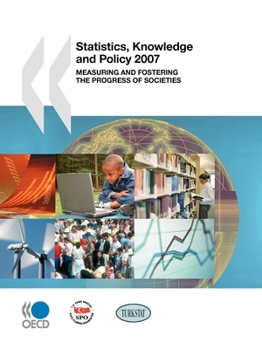Statistics, Knowledge and Policy 2007: Measuring and Fostering the Progress of Societies
Is life getting better? Are our societies making progress? Indeed, what does "progress" mean to the world's citizens? There can be few questions of greater importance in today's rapidly changing world. And yet how many of us have the evidence to answer these questions? For a good portion of the 20th century there was an implicit assumption that economic growth was synonymous with progress: an assumption that a growing GDP meant life must be getting better. But we now recognize that it isn't quite as simple as that. Despite high levels of economic growth in many countries many experts believe we are no happier than they were 50 years ago; that people trust one another - and their governments - less than they used to; and that increased income has come at the expense of increased insecurity, longer working hours and greater complexity in our lives. Much of the world is healthier and people live longer than they did just a few years ago, but environmental problems like climate change cast a shadow over an uncertain future. Indeed, it sometimes seems that for every action to demonstrate societal progress, an equal but opposite reaction demonstrates precisely the opposite. And when the experts disagree, what hope do the citizens have to engage in democratic debate about their future and make the right choices at the ballot box? Access to accurate information is vital when we come to judge our politicians and hold them accountable. But access to a comprehensive and intelligible portrait of that most important of questions - whether or not life has got and is likely to get better - is lacking in many societies. Concerns about this have been growing. And over the past 10 years or so there has been an explosion of interest in produce measures of societal progress. Measures that go beyond GDP to represent a broader view of the ways in which societies are progressing and regressing. Measures which are based on the values of a society, not those of a single political party or an elite few. Such sets of progress measures can help governments focus in a more joined up way on what really matters: they can foster a more informed debate on where a society is, where it wants to head, and - crucially - the choices it needs to make if it is to get there. By measuring progress we can foster progress. The OECD's 2nd World Forum on Statistics, Knowledge and Policy 'Measuring and Fostering the Progress of Societies' held in Istanbul in June 2007 brought together a diverse group of leaders from more than 130 countries to debate these issues. These proceedings contain the papers presented at the Forum.
Format:Paperback
Language:English
ISBN:9264043233
ISBN13:9789264043237
Release Date:October 2008
Publisher:Org. for Economic Cooperation & Development
Length:564 Pages
Weight:2.78 lbs.
Dimensions:1.1" x 8.3" x 11.0"
Customer Reviews
0 rating





